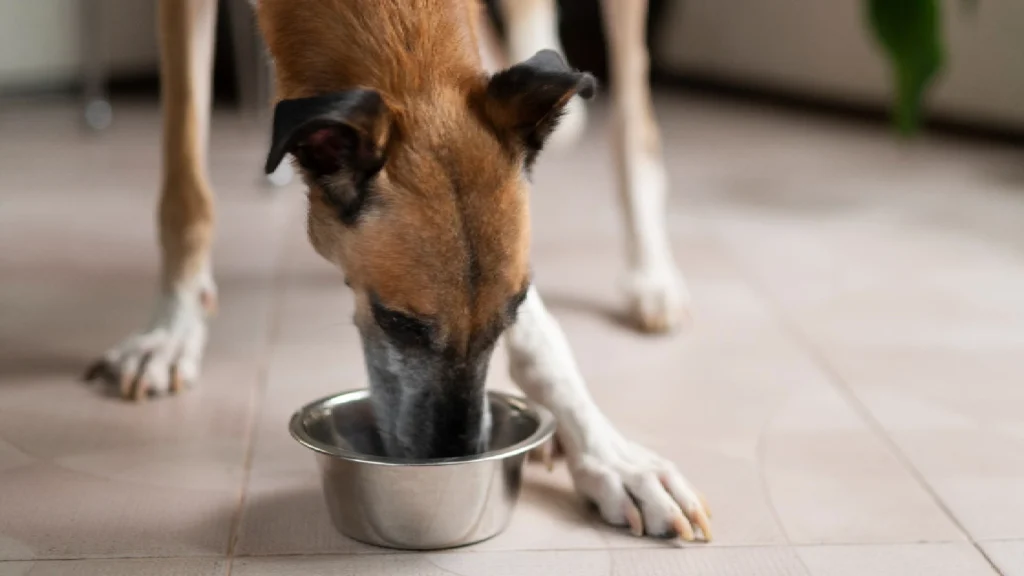
Introduction
A dog’s health and happiness depend greatly on their nutrition. Just like humans, dogs require a well-balanced diet that provides them with the necessary nutrients to thrive. As a responsible dog owner, it’s essential to understand the best ingredients to include in your furry friend’s meals. In this ultimate guide, we will unveil the key ingredients that contribute to a healthy and happy dog.
Proper nutrition plays a vital role in various aspects of a dog’s well-being, including their energy levels, immune system, coat condition, and overall longevity. By selecting the right ingredients, you can ensure that your dog receives the essential nutrients they need to live a vibrant and fulfilling life.
From high-quality proteins to healthy fats, complex carbohydrates to superfoods packed with beneficial nutrients, we will unravel the best options available to you. Additionally, we will address special dietary considerations based on factors like age and specific health conditions.
While there is a wide array of dog food choices available in the market, it’s important to be discerning about the ingredients present in them. We will discuss how to identify and prioritize high-quality ingredients while avoiding fillers and artificial additives that may compromise your dog’s health.
By the end of this ultimate guide, you will have a comprehensive understanding of the best ingredients for dogs. Armed with this knowledge, you can make informed choices that will contribute to your furry companion’s vitality and ensure they live their best life by your side. So let’s dive in and unveil the secrets to nourishing your dog with the finest ingredients available.
Understanding Dog Nutrition
Key nutrients required for a dog’s health
When it comes to dog nutrition, there are several key nutrients that play a crucial role in maintaining their overall health. These nutrients include proteins, fats, carbohydrates, vitamins, and minerals. Each nutrient serves a specific purpose and contributes to different aspects of a dog’s well-being.
- Proteins: Proteins are the building blocks of a dog’s body. They are essential for healthy muscles, organs, skin, and coat. High-quality animal-based proteins, such as chicken, beef, and lamb, provide the necessary amino acids that dogs need for growth, repair, and maintenance.
- Fats: Fats are a concentrated source of energy and play a vital role in a dog’s diet. They provide insulation, support cell function, aid in the absorption of fat-soluble vitamins, and contribute to healthy skin and a lustrous coat. Healthy fat sources for dogs include fish oil, flaxseed oil, and chicken fat.
- Carbohydrates: While dogs are primarily carnivores, carbohydrates can still have a place in their diet. Complex carbohydrates, such as whole grains and fiber-rich vegetables, provide dogs with a steady release of energy, aid in digestion, and support bowel regularity.
- Vitamins: Dogs require a range of vitamins for various bodily functions. These include vitamins A, B, C, D, E, and K. Vitamins play a crucial role in supporting immune function, promoting healthy eyesight, aiding in metabolism, and maintaining overall well-being.
- Minerals: Minerals, such as calcium, phosphorus, iron, and zinc, are necessary for proper bone development, muscle function, and overall cellular health. They are involved in numerous physiological processes and are vital for maintaining a dog’s overall health and vitality.
Balancing macronutrients (proteins, fats, carbohydrates)
Achieving the right balance of macronutrients is essential for a dog’s overall health and well-being. Dogs require a diet that provides an appropriate ratio of proteins, fats, and carbohydrates based on their age, activity level, and specific dietary needs.
- Proteins: Dogs need a sufficient amount of high-quality proteins in their diet to meet their nutritional requirements. The protein content in dog food should be appropriate for their life stage and activity level. Puppies, active dogs, and pregnant or lactating females may require higher protein levels than adult dogs.
- Fats: Dogs require a certain amount of dietary fat for energy and to support various bodily functions. It’s important to choose healthy fats that provide essential fatty acids, such as omega-3 and omega-6, which contribute to skin and coat health, immune function, and inflammation control.
- Carbohydrates: While dogs don’t have a strict carbohydrate requirement, including carbohydrates in their diet can provide valuable nutrients and energy. Complex carbohydrates, such as whole grains and vegetables, are generally more beneficial for dogs compared to simple sugars or refined grains.
Essential vitamins and minerals
In addition to proteins, fats, and carbohydrates, dogs require a range of essential vitamins and minerals to maintain optimal health. These micronutrients support various physiological functions and should be included in a well-balanced diet.
- Vitamin A: Important for vision, immune function, and growth.
- B Vitamins: B vitamins, including B1, B2, B6, and B12, are essential for metabolism, energy production, and nervous system function.
- Vitamin C: While dogs can produce their own vitamin C, supplementation may be beneficial in certain situations. Vitamin C acts as an antioxidant and supports the immune system.
- Vitamin D: Necessary for proper calcium and phosphorus absorption, contributing to healthy bone development
Identifying High-Quality Ingredients
When it comes to selecting dog food or preparing homemade meals for your furry companion, it’s crucial to prioritize high-quality ingredients. The quality of the ingredients directly impacts your dog’s overall health and well-being. Here are some essential tips for identifying and choosing the best ingredients for your dog:
A. Avoiding fillers and artificial additives
- Fillers: Avoid dog foods that contain excessive amounts of fillers such as corn, wheat, and soy. These ingredients offer limited nutritional value and can contribute to allergies or digestive issues in some dogs. Look for products that prioritize whole-food ingredients instead.
- Artificial additives: Steer clear of dog foods that contain artificial colors, flavors, and preservatives. These additives can be detrimental to your dog’s health and may cause adverse reactions. Opt for products with natural ingredients and minimal processing.
B. Importance of whole-food ingredients
- Meat sources: Look for dog foods that list high-quality meat sources, such as chicken, beef, turkey, or fish, as the primary ingredient. These whole-food protein sources are rich in essential amino acids and provide optimal nutrition for your dog.
- Fruits and vegetables: Including a variety of fruits and vegetables in your dog’s diet can provide valuable vitamins, minerals, and antioxidants. Look for dog foods that incorporate ingredients like sweet potatoes, carrots, blueberries, and spinach.
- Whole grains: If your dog tolerates grains well, opt for whole grains like brown rice, quinoa, and oats. These grains offer beneficial fiber and nutrient content.
C. Reading and understanding dog food labels
- Ingredient list: Pay attention to the ingredient list on dog food labels. Ingredients are listed in descending order by weight, so the first few ingredients are the most significant. Ensure that high-quality protein sources are listed at the top.
- Named meat sources: Look for specific named meat sources (e.g., “chicken meal” instead of generic terms like “meat meal”). Specific named sources indicate higher quality and provide transparency about the protein content.
- AAFCO statement: Check for an AAFCO (Association of American Feed Control Officials) statement on the label. This ensures that the dog food meets the minimum nutritional standards established by AAFCO.
- Guaranteed analysis: The guaranteed analysis section provides information about the nutrient content of the dog food, including protein, fat, fiber, and moisture percentages. Use this information to evaluate the nutritional profile of the product.
By being mindful of these guidelines and taking the time to read and understand dog food labels, you can make informed decisions about the quality of ingredients in the food you provide for your dog. Choosing high-quality ingredients will contribute to their overall health, vitality, and happiness.
Best Protein Sources for Dogs
Proteins are essential for dogs as they provide the building blocks for strong muscles, healthy organs, and a robust immune system. When selecting protein sources for your dog, it’s important to choose high-quality options that offer a complete amino acid profile. Here are some of the best protein sources for dogs:
A. Meat-based proteins
- Chicken: Chicken is a widely available and highly digestible protein source for dogs. It is lean and rich in essential amino acids, making it an excellent choice for dogs of all ages and sizes.
- Beef: Beef is another nutritious protein source that provides essential amino acids and valuable minerals like iron and zinc. Opt for lean cuts of beef to avoid excessive fat content.
- Lamb: Lamb is a nutrient-dense protein source that offers a distinct flavor. It is a good option for dogs with food sensitivities or allergies to more common protein sources like chicken or beef.
- Turkey: Turkey is a lean protein source that provides essential amino acids and is often easier to digest than some other meats. It can be a great choice for dogs with sensitive stomachs.
B. Alternative protein sources
- Fish: Fish, such as salmon, mackerel, and sardines, is an excellent source of protein for dogs. It is rich in omega-3 fatty acids, which promote a healthy coat, skin, and joint health. Ensure the fish is cooked and free from bones.
- Eggs: Eggs are a complete protein source that is highly digestible for dogs. They contain essential amino acids and are rich in vitamins and minerals. Serve cooked eggs to avoid the risk of bacterial contamination.
- Plant-based proteins: While dogs are primarily carnivorous, some plant-based protein sources can be included in their diet. Examples include legumes (e.g., lentils, chickpeas), quinoa, and tofu. However, it’s important to ensure that these plant-based proteins are complemented with animal-based proteins to provide a balanced amino acid profile.
When selecting protein sources for your dog, it’s crucial to consider their specific dietary needs, age, activity level, and any known food allergies or sensitivities. Consulting with a veterinarian can provide valuable guidance in determining the most suitable protein sources for your furry friend’s individual requirements.
Remember to introduce new protein sources gradually and monitor your dog’s response to ensure they tolerate and enjoy the selected proteins. Providing a variety of high-quality protein sources will help ensure your dog receives the essential nutrients they need for optimal health and well-being.
Healthy Fats for Optimal Dog Health
Fat is an essential component of a dog’s diet and plays a crucial role in their overall health and well-being. Including healthy fats in your dog’s meals can provide numerous benefits, such as promoting a shiny coat, supporting brain function, and maintaining a healthy immune system. Here are some healthy fat sources to consider for your furry friend:
A. Fish Oil: Fish oil, derived from fatty fish like salmon, mackerel, or sardines, is rich in omega-3 fatty acids. These fatty acids have anti-inflammatory properties, support cardiovascular health, and promote a healthy coat and skin.
B. Flaxseed Oil: Flaxseed oil is another excellent source of omega-3 fatty acids, specifically alpha-linolenic acid (ALA). It can contribute to healthy skin, reduce inflammation, and support brain function.
C. Coconut Oil: Coconut oil contains medium-chain triglycerides (MCTs), which are easily digestible and provide a quick source of energy. Coconut oil may also have antimicrobial properties and can contribute to healthy skin and coat.
D. Olive Oil: Olive oil is a heart-healthy fat that contains monounsaturated fatty acids (MUFAs). It provides antioxidants and can support overall well-being. However, it’s important to use olive oil in moderation due to its high-calorie content.
E. Chicken Fat: Chicken fat is a natural source of omega-6 fatty acids, which are essential for maintaining healthy skin and coat. It also adds flavor to your dog’s food.
F. Avocado: Avocado is a nutrient-rich fruit that offers healthy fats, vitamins, and minerals. It contains monounsaturated fats that can support heart health and contribute to a shiny coat.
When incorporating healthy fats into your dog’s diet, it’s essential to consider their specific dietary needs, including any underlying health conditions or allergies. Consult with your veterinarian to determine the appropriate amount of healthy fats to include in your dog’s meals based on their age, size, and activity level.
It’s important to note that fats should be incorporated in moderation and as part of a balanced diet. Too much fat can lead to weight gain and other health issues. Always introduce new fats gradually and monitor your dog’s response to ensure they tolerate them well.
By including healthy fats in your dog’s diet, you can support their overall health, promote a glossy coat, and contribute to their overall vitality and well-being.
Complex Carbohydrates for Sustained Energy
Carbohydrates are an essential energy source for dogs, providing the fuel they need for daily activities and bodily functions. While dogs are primarily carnivores, including complex carbohydrates in their diet can offer sustained energy and other nutritional benefits. Here are some complex carbohydrates that can support your dog’s energy levels and overall health:
A. Whole Grains: Whole grains, such as brown rice, oats, barley, and quinoa, are nutritious carbohydrate sources that provide fiber, vitamins, and minerals. They offer a slow release of energy, helping to keep your dog energized throughout the day.
B. Sweet Potatoes: Sweet potatoes are a nutrient-dense complex carbohydrate that provides dietary fiber, vitamins A and C, and essential minerals. They are a great alternative to grains and offer a natural source of sustained energy.
C. Lentils: Lentils are legumes that offer complex carbohydrates, fiber, and protein. They provide a steady release of energy and are rich in essential nutrients like iron and folate.
D. Pumpkin: Pumpkin is not only a superfood but also a good source of complex carbohydrates. It contains dietary fiber and various vitamins and minerals that support digestion and provide lasting energy.
E. Peas: Peas are another legume rich in complex carbohydrates, fiber, and protein. They can provide sustained energy and contribute to a healthy digestive system.
When incorporating complex carbohydrates into your dog’s diet, it’s essential to consider their specific dietary needs, such as age, activity level, and any dietary restrictions. Consulting with your veterinarian can help determine the appropriate amount and types of carbohydrates suitable for your dog.
Remember that moderation is key when it comes to carbohydrates, as excessive intake can lead to weight gain and other health issues. It’s important to balance carbohydrates with other essential nutrients in your dog’s diet.
By including complex carbohydrates in your dog’s meals, you can provide them with sustained energy, support healthy digestion, and contribute to their overall well-being.
Superfoods for Added Nutrition
Superfoods are nutrient-rich ingredients that provide exceptional health benefits due to their high concentrations of vitamins, minerals, antioxidants, and phytonutrients. Including superfoods in your dog’s diet can enhance their overall nutrition and support their well-being. Here are some superfoods that can provide added nutrition for your furry friend:
A. Blueberries: Blueberries are packed with antioxidants, vitamins, and fiber. They can support brain health, boost the immune system, and provide anti-inflammatory benefits.
B. Spinach: Spinach is a leafy green vegetable rich in vitamins A, C, and K, as well as iron and folate. It offers antioxidants and supports healthy digestion.
C. Pumpkin: Pumpkin is a fantastic source of fiber and can aid in digestive health. It is also rich in vitamins A, C, and E, as well as beta-carotene, which supports eye health and immune function.
D. Sweet Potatoes: Sweet potatoes are a nutrient-dense carbohydrate source that provides dietary fiber, vitamins A and C, and antioxidants. They contribute to a healthy coat and support a strong immune system.
E. Coconut: Coconut products, such as coconut oil or shredded coconut, offer medium-chain fatty acids that can support healthy skin and coat. They also provide antimicrobial properties and support immune function.
F. Chia Seeds: Chia seeds are rich in omega-3 fatty acids, fiber, and antioxidants. They can aid in digestion, promote a healthy coat, and provide energy.
G. Turmeric: Turmeric contains curcumin, a powerful antioxidant and anti-inflammatory compound. It may help alleviate joint pain and support overall immune function.
H. Salmon: Salmon is a superfood for both dogs and humans. It is an excellent source of omega-3 fatty acids, which support heart health, joint function, and a shiny coat.
I. Kale: Kale is a nutrient powerhouse that offers vitamins A, C, and K, as well as calcium and antioxidants. It can contribute to healthy eyesight and promote overall well-being.
J. Apples: Apples provide fiber, vitamins A and C, and antioxidants. They can freshen breath and support dental health when given as a crunchy treat.
It’s important to note that while superfoods offer exceptional health benefits, they should be incorporated into your dog’s diet in moderation and in consultation with your veterinarian. Some superfoods may not be suitable for all dogs, especially those with specific health conditions or dietary restrictions.
When introducing superfoods, ensure they are prepared and served in a dog-friendly manner. For example, fruits and vegetables should be washed thoroughly and cut into appropriate sizes to prevent choking hazards.
By incorporating these superfoods into your dog’s diet, you can provide them with additional nutrition and support their overall health and vitality. Remember to prioritize variety and balance in their meals to ensure they receive a well-rounded nutrient profile.
Special Dietary Considerations
Just like humans, dogs may have specific dietary considerations based on their individual needs, health conditions, or lifestyle. Understanding and addressing these considerations can help ensure your dog receives the best nutrition for their well-being. Here are some special dietary considerations to keep in mind:
A. Allergies and Food Sensitivities: Some dogs may have allergies or sensitivities to certain ingredients, such as grains, specific proteins (e.g., chicken or beef), or common allergens like soy or dairy. Identifying and avoiding these triggers is crucial in providing a suitable diet. Consider hypoallergenic or limited-ingredient dog foods that cater to food sensitivities.
B. Weight Management: If your dog is overweight or prone to weight gain, maintaining a healthy weight is important to prevent obesity-related health issues. Opt for a balanced diet with controlled portion sizes and consult with your veterinarian for guidance on weight management strategies.
C. Senior Dogs: As dogs age, their nutritional needs change. Senior dogs may require lower-calorie diets to prevent weight gain, as well as specific nutrients to support joint health, cognitive function, and immune system function. Look for dog foods formulated specifically for senior dogs or consult with your veterinarian for tailored recommendations.
D. Puppy Nutrition: Puppies have unique nutritional requirements for growth and development. They need higher levels of protein, essential fatty acids, and specific vitamins and minerals. Choose a high-quality puppy food that meets the Association of American Feed Control Officials (AAFCO) guidelines for growth or consult with your veterinarian for personalized advice.
E. Breed-Specific Considerations: Some dog breeds may have specific dietary considerations based on their size, metabolism, or breed-related health conditions. Large breed puppies, for example, may require controlled calcium levels to support proper bone development. Research breed-specific dietary guidelines or consult with your veterinarian to ensure you are meeting your dog’s specific needs.
F. Medical Conditions: Dogs with certain medical conditions, such as diabetes, kidney disease, or gastrointestinal issues, may require specialized diets. These diets are designed to manage the condition and support your dog’s health. Work closely with your veterinarian to determine the appropriate diet for your dog’s specific medical condition.
G. Raw or Homemade Diets: Some dog owners prefer to feed their dogs raw or homemade diets. While these diets can offer certain benefits, they require careful attention to ensure they meet all of your dog’s nutritional needs. Consult with a veterinary nutritionist to formulate a balanced and complete raw or homemade diet for your dog.
Always remember that each dog is unique, and what works for one may not work for another. It’s essential to monitor your dog’s health, body condition, and overall well-being when making dietary changes. Regularly consult with your veterinarian to ensure your dog’s nutritional needs are being met and to address any specific dietary considerations they may have.
By considering these special dietary considerations and providing a tailored diet, you can support your dog’s health, happiness, and longevity.
Homemade vs. Commercial Dog Food
Choosing the right type of food for your furry companion is a significant decision as it directly impacts their health and well-being. When it comes to dog food, two main options are available: homemade and commercial. Each option has its advantages and considerations. Let’s explore the factors to consider when deciding between homemade and commercial dog food:
A. Nutritional Balance:
- Commercial Dog Food: Reputable commercial dog food brands undergo rigorous testing and adhere to nutritional standards. They are formulated to provide a complete and balanced diet, containing the necessary proteins, carbohydrates, fats, vitamins, and minerals your dog needs. Look for brands that meet the Association of American Feed Control Officials (AAFCO) guidelines.
- Homemade Dog Food: Homemade diets require careful attention to ensure they provide all the essential nutrients. It is crucial to work with a veterinary nutritionist to formulate a balanced recipe tailored to your dog’s specific needs. Nutrient deficiencies or imbalances can occur if homemade diets are not carefully planned and may require additional supplements.
B. Quality and Safety:
- Commercial Dog Food: Reputable commercial dog food brands follow strict quality control measures to ensure their products are safe, free from contaminants, and nutritionally balanced. They often conduct research and have quality assurance processes in place.
- Homemade Dog Food: The quality and safety of homemade dog food depend on the ingredients used and the preparation methods. Care must be taken to handle ingredients properly, prevent bacterial contamination, and source high-quality ingredients from reputable sources.
C. Convenience and Time:
- Commercial Dog Food: Commercial dog food offers convenience as it is readily available in stores and online. It requires minimal preparation and can be easily stored. It is suitable for dog owners with busy lifestyles or limited time for meal preparation.
- Homemade Dog Food: Preparing homemade dog food requires time and effort. It involves sourcing ingredients, proper food preparation, and portioning. It can be time-consuming, especially when formulating and adjusting recipes to meet your dog’s nutritional needs.
D. Cost:
- Commercial Dog Food: Commercial dog food comes in a range of prices, depending on the brand and quality. While some premium brands may be more expensive, there are also budget-friendly options available. Consider the long-term cost and value of the chosen brand.
- Homemade Dog Food: The cost of homemade dog food can vary depending on the ingredients used, including fresh meats, vegetables, and supplements. It is essential to factor in the cost of high-quality ingredients, potential supplements, and veterinary consultation fees for recipe formulation.
E. Specific Dietary Needs:
- Commercial Dog Food: Commercial dog food offers a wide range of options, including specialized diets for specific dietary needs, such as grain-free, limited ingredient, or hypoallergenic formulas. They may cater to dogs with specific health conditions, breed sizes, or life stages.
- Homemade Dog Food: Homemade diets can be tailored to meet specific dietary requirements, especially for dogs with unique needs or food sensitivities. Working with a veterinary nutritionist ensures that homemade diets address specific health concerns or restrictions.
It’s important to note that both homemade and commercial dog food can provide a healthy and balanced diet for your dog. The choice depends on your dog’s individual needs, your preferences, and available resources. Consulting with a veterinarian or veterinary nutritionist is recommended to make an informed decision based on your dog’s specific requirements.
In some cases, a combination of homemade and commercial dog food may be suitable, allowing you to incorporate fresh, wholesome ingredients into your dog’s diet while ensuring nutritional balance and convenience. Ultimately, the priority should be providing your dog with a well-balanced diet that meets their nutritional needs and supports their overall health and happiness.
The Importance of Consulting a Veterinarian for Your Dog’s Nutrition
When it comes to your dog’s nutrition, consulting a veterinarian is crucial for ensuring their health and well-being. Veterinarians are trained professionals who have in-depth knowledge of animal nutrition and can provide expert guidance tailored to your dog’s specific needs. Here are some key reasons why consulting a veterinarian is essential:
- Individualized Guidance: Every dog is unique, with varying nutritional requirements based on factors such as age, breed, size, activity level, and overall health. A veterinarian can assess your dog’s specific needs and recommend a diet that meets their nutritional requirements. They can provide personalized guidance on portion sizes, feeding schedules, and dietary adjustments as your dog’s needs change over time.
- Preventing Nutritional Imbalances: Nutritional imbalances can lead to health issues in dogs. A veterinarian can help you understand the importance of essential nutrients, such as proteins, carbohydrates, fats, vitamins, and minerals, in your dog’s diet. They can guide you in selecting high-quality commercial dog food or formulating a balanced homemade diet that meets these nutritional needs.
- Addressing Health Conditions: Dogs with certain health conditions, such as allergies, gastrointestinal disorders, kidney disease, or obesity, may require specific dietary modifications. A veterinarian can provide tailored recommendations to manage these conditions effectively through appropriate diet choices. They can also monitor your dog’s progress and make necessary adjustments to the diet as needed.
- Weight Management: Maintaining a healthy weight is essential for your dog’s overall health and longevity. An overweight or underweight dog may require dietary changes to achieve a healthy body condition. A veterinarian can help you determine the ideal weight for your dog and provide guidance on portion control, calorie intake, and appropriate exercise routines to manage their weight effectively.
- Monitoring for Allergies and Sensitivities: Dogs can develop allergies or food sensitivities, resulting in symptoms such as skin irritations, digestive issues, or recurring ear infections. A veterinarian can help identify potential allergens or triggers and recommend suitable diets, including hypoallergenic or limited-ingredient options, to manage these conditions.
- Transitioning to New Diets: When introducing a new diet, whether it’s a different brand of commercial dog food or a homemade diet, a veterinarian can guide you through a gradual transition process. They can advise on the appropriate timeline, portion sizes, and monitor your dog’s response to ensure a smooth and successful transition.
- Regular Health Check-ups: While discussing your dog’s nutrition, a veterinarian can also conduct regular health check-ups, ensuring your dog’s overall well-being. They can assess their body condition, dental health, and address any concerns or questions you may have regarding their nutrition or general health.
Remember that nutrition plays a vital role in your dog’s overall health and quality of life. Consulting a veterinarian ensures that you make informed decisions about their diet, address any specific needs or health conditions, and provide them with the best possible care. Working together with a veterinarian, you can create a nutrition plan that supports your dog’s unique requirements and helps them thrive.
Conclusion
Providing your dog with a healthy and balanced diet is essential for their overall health, happiness, and longevity. Understanding the best ingredients for dogs and making informed choices about their nutrition can make a significant difference in their well-being. Whether you opt for commercial dog food or homemade diets, it’s crucial to prioritize their nutritional needs and consult with a veterinarian for expert guidance.
Throughout this ultimate guide, we’ve explored various aspects of dog nutrition, including understanding dog nutrition, identifying high-quality ingredients, best protein sources, superfoods for added nutrition, healthy fats, complex carbohydrates, special dietary considerations, and the importance of consulting a veterinarian. By considering these factors and seeking professional advice, you can make informed decisions about your dog’s diet and ensure they receive the best possible nutrition.
Remember, every dog is unique, and their nutritional needs may vary based on factors such as age, breed, size, and health conditions. Regular monitoring of your dog’s body condition, overall health, and consulting with a veterinarian will help you adjust their diet as needed and provide the best care.
As a responsible dog owner, your dedication to their nutrition will contribute to their overall well-being and enhance their quality of life. So, take the time to research, consult with experts, and make informed choices to unveil the best ingredients for a healthy and happy dog. Your furry companion will thank you with their wagging tail, boundless energy, and unconditional love for years to come.




